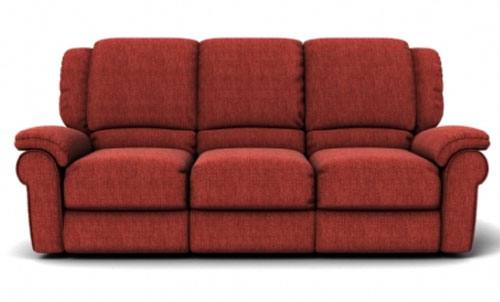Sales line (01507-611065) open : Monday - Friday, 9.30am - 5.15pm.
How To Clean a Sofa or Suite: A Comprehensive Guide
How often do you clean your sofa?
It might be the comfiest seat in the house, but if you don't take good care of it, the sofa can also become the dirtiest.
If you have young children, you'll probably be well used to the spillages and dirt that they can inflict on your suite. Pets can have the same effect, bringing mud and debris in from outside that they transfer to the sofa, or shedding fur over your upholstery.
There's also spillages and accidents.

A sofa is a household essential, but if not properly looked after can become dirty and unhygienic. Ensure you clean your sofa regularly.
When your sofa entertains you or your guests, it picks up dust, grime and body oils that can make it grubby, unclean and unhygienic. So you can see just how important it is to ensure that you keep the sofa as clean as possible.
There are professional sofa cleaning services available, but these can be expensive, especially if used regularly. Fortunately, there are plenty of upholstery cleaning methods that allow you to do the work yourself, which saves money and hassle.
We've put together this guide to bring you some basic sofa cleaning advice. Read on for more information on the considerations you need to make when cleaning different styles of sofa.
Before Cleaning Your Sofa...
Whatever you do, don't just dive in with a bucket of soapy water and a sponge. If you don't use the proper materials and techniques, you could actually damage your suite, rather than cleaning it.
The first thing you need to do is establish what the sofa is made of, and to ensure that you follow the correct procedures for cleaning that particular material. When you purchased the suite, you should have received a care guide or information booklet that will offer advice on the sofa's materials and how to clean them.
If you can't find the booklet or are unsure, you can contact your supplier or the furniture manufacturer for advice.
Most manufacturers follow a code system which denotes how you should clean the sofa. These are the codes you are likely to see when checking the labels on your suite:
- W: Indicates that the suite can be cleaned using a water based detergent.
- S or P: Means that the sofa or upholstery needs to be dry cleaned or cleaned with a water free detergent.
- S/W: Indicates that the sofa can either be cleaned with a water based detergent or dry cleaned.
- X: Denotes that the suite should be cleaned using only a vacuum cleaner, or by a professional cleaner.
When you are using cleaning substances and products on your sofa, make sure you know that it won't cause damage such as staining or discolouring. Before you clean an armchair or suite, test the cleaning product or solution on a small, hidden part of the furniture. Leave this to dry and then check to make sure there is no damage.
If there is any discolouring or damage to the spot where you tested the cleaning product, do not use it on the rest of the sofa. If the test area is free of damage, you can proceed and clean the suite.
Regular Sofa Care
In order to ensure that your sofa lasts as long as possible and remains hygienic, it's always a good idea to keep it as clean and grime free as possible.
Using an upholstery brush and giving it a quick once over with the vacuum a couple of times a week can help to keep dirt and dust to a minimum.
Building this into your regular home cleaning schedule will save time in the long run, and will also mean that your sofa or suite will last much longer than if you leave it to fall into disrepair.
Using a detergent and water (where necessary) should be done every few months in order to keep your sofa looking as good as new. Any stains should be blotted and treated as soon as they occur. There are dedicated stain removal products available for upholstery, but check the bottle to ensure that they are suitable for use with your suite.
When it comes to a thorough clean of your sofa, the steps you take will depend on the material of the suite and the instructions given on the label or care guide.
How To Clean A Fabric Sofa

A fabric sofa may be cleaned in a number of ways, depending on the type of fabric. Check the label and manufacturer's information to determine how to clean a fabric sofa.
Cleaning a fabric sofa depends on the type of fabric, and the directions for cleaning that are provided. Firstly, the job can be made slightly easier if your suite has removable covers. If this is the case, simply unzip the cover and remove from the suite, and very often you'll be able to place them in the washing machine with a mild detergent.
For any parts that can't be removed, look at the code on the sofa label.
If it says 'W' or 'S/W', use a water based detergent solution, consisting of a mild detergent or washing liquid and warm water. Use a cloth to gently wipe the surface, being careful not to saturate the fabric with water.
Allow the sofa to dry naturally. Opening windows is a good way to speed up the process, as the draft or breeze will aid the drying of the suite.
For upholstery that carries the 'S' or a 'P' code on its label, a dry cleaning method is required. Do not use water on this kind of sofa, as it can ruin the upholstery by discolouring, shrinking the fabric or leaving water marks. If you are in doubt, you can call in a professional dry cleaner to take care of the sofa.
Alternatively, you can use a dry cleaning solvent which is available to buy in stores. As ever, ensure that you test this on a part of the sofa is not visible to guests prior to using it. If there is no negative reaction, you can proceed with the dry cleaning solvent.
Apply the dry cleaning solvent to a dry cloth and blot over the sofa, which will help to remove stains and grime. Use a clean cloth to press into the upholstery and remove any excess solvent.
If your sofa carries the 'X' symbol, do not use any water, detergents or cleaning products on it. Instead, remove any debris with a soft brush, and clean the sofa regularly with a vacuum cleaner.
How To Clean A Leather Sofa

A leather sofa is different from a fabric suite, and therefore needs different products to be cleaned effectively. Ensure you use proper leather cleaner and leather conditioner when cleaning a leather sofa.
Cleaning leather sofas requires different materials and products to fabric cleaning. Using standard detergents or powders can result in leather being damaged, causing discolouration and possible shrinkage of the leather. The leather may also become weak or cracked, which can drastically shorten the lifespan of your suite.
When you are cleaning leather upholstery, use a leather cleaner product diluted with water. When the solution forms suds, dip a cleaning cloth in and wring it out. Working in small sections, wipe down the leather and then use a damp clean cloth to remove any excess suds.
Dry any damp areas with a clean, dry cloth. Once the sofa is clean and dry, put some leather conditioner on a cloth and apply it to the leather by rubbing gently, again working in small sections. This will keep the leather conditioned and feeling soft and supple, preventing the upholstery from drying out and cracking.
Make Your Sofa Last
As with any household product, giving your sofa proper care and attention can ensure that it lasts for as long as possible. Failing to regularly clean your suite can mean that it quickly becomes worn and tatty, as well as being unhygienic thanks to a build up of dirt and bacteria.
When was the last time you cleaned your sofa? Make sure you get back into an upholstery cleaning routine to make your sofa last.
Disclaimer: The advice and information in this post is intended as a guideline only. If in doubt when cleaning your sofa, consult the product information or contact your supplier.



















